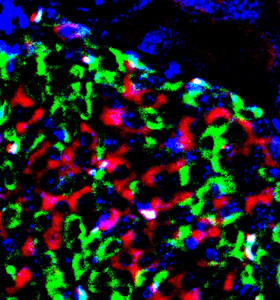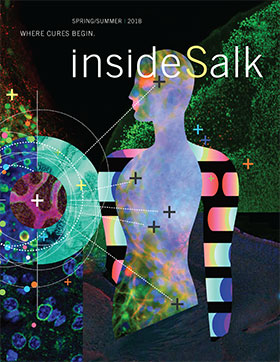|
|
 |
May 2018 |
|
|
|
|
|
|
|
|
Understanding how DNA is selectively tagged with "do not use" marks
|
|
|
|
|
Not all of your genome needs to be active at any given time. Some regions are prone to hopping around if left unchecked; others code for genes that need to be turned off in certain cells or at certain times. One way that cells keep these genetic elements under control is with the chemical equivalent of a "do not use" sign. This chemical signal, called DNA methylation, is known to vary in different cell types or at different stages of development, but the details of how cells regulate exactly where to put DNA methylation marks have remained unclear.
Plant biologists in the lab of
Julie Law discovered a small family of proteins that control where in the genome DNA methylation marks are added. The team's work, published in
Nature Genetics, is highly relevant for processes that range from normal development to cellular defects and diseases, which can arise due to erroneous DNA methylation patterns in plants and/or humans, respectively.
|
|
|
| Boosting the effects of Vitamin D to tackle diabetes |
|
 |
More than 27 million people in the United States are living with
type 2 diabetes. Researchers in the lab of
Ronald Evans reported a new approach to protecting beta cells
---the cells in the pancreas that produce, store and release the hormone insulin. The approach uses a compound combined with vitamin D to improve the survival of beta cells, bringing glucose back to normal levels in a mouse model. The paper was published in the journal
Cell.
|
|
|
|
| Interconnected cells-in-a-dish let researchers study brain disease |
By creating multiple types of neurons from stem cells and observing how they interact, scientists in
Rusty Gage's lab have developed a new way to study the connections between brain cells in the lab. Using the technique, which generates a partial model of the brain, the team showed how communication between neurons is altered in people with
schizophrenia. They described the work in
Cell Stem Cell
.
|
 |
|
|
|
| Where brain cells get their information may determine their roles in diseases |
 |
Xin Jin's lab mapped information flow in a region of the brain called the striatum, an area associated with action control and learning. In the process, the lab clarified the relationship of two types of neurons to psychiatric and sensory/movement disorders. The different communication pathways these two types of "interneurons" represent may offer new drug targets for disorders as diverse as
Parkinson's, OCD, depression and autism. The work appeared in the journal
eLife.
|
|
|
|
|
Organoids reveal how a deadly brain cancer grows
|
|
|
|
It's virtually impossible to observe how tumors of the incredibly deadly
brain cancer glioblastoma multiforme (GBM) operate in their natural environment, and animal models don't always provide good answers. But by editing two genes in just a few cells in human cerebral organoids, scientists in the Verma lab generated aggressive GBM tumors in dishes. This new model could be used to study tumor progression, investigate new drugs or even personalize treatments for patients. The study was published in the journal
Cell Reports.
|
|
|
|
Salk Institute launches Conquering Cancer Initiative
|
|
|
On April 20, the Salk Institute, home to one of the first National Cancer Institute (NCI)-designated basic research cancer centers in the United States, launched a new initiative called
Conquering Cancer to harness specific and emerging scientific strategies to tackle five of the deadliest
cancers: pancreatic, ovarian, lung, brain (glioblastoma) and triple-negative breast. The keynote address was delivered by Joseph R. Biden, Jr., 47th Vice President of the United States, who led the White House Cancer Moonshot initiative.
|
|
|
|
|
|
|
|
Salk Institute's Joanne Chory awarded prestigious Gruber Prize
Salk Professor and Howard Hughes Medical Institute Investigator
Joanne Chory, one of the world's foremost plant biologists, has been awarded a 2018 Gruber Genetics Prize by the
Gruber Foundation for her "groundbreaking work in identifying the basic regulatory and biochemical mechanisms underlying the development of plants." She shares the $500,000 award with Elliot Meyerowitz of the California Institute of Technology.
|
|
|
Nicola Allen awarded grant by Coins for Alzheimer's Research Trust
Salk Assistant Professor
Nicola Allen has received a grant for $112,500 from the
Coins for Alzheimer's Research Trust (CART), which is an organization supported by the Rotary Clubs of North America. The grant will enable a two-year project to identify how support cells, called astrocytes, regulate the brain when healthy, understand how astrocytes go wrong in
Alzheimer's disease and test whether astrocytes can be used as a therapy to repair damaged neurons.
|
|
|
|
|
Ronald Evans receives Vallee Award and Horwitz Prize
Salk Professor
Ronald Evans has received two prizes, each totaling $10,000: the Bert and Natalie Vallee Award in Biomedical Science, which was established by the
Vallee Foundation to recognize international achievements in the sciences essential to medicine, and the Louisa Gross Horwitz Prize, which was initiated through a bequest to Columbia University and honors scientists who have made outstanding contributions to basic research in the fields of biology and biochemistry.
|
|
|
Three Salk faculty honored with endowed chairs
|
|
Three Salk scientists have been given endowed chairs at the Institute:
|
 |
Katherine Jones, named to the Edwin K. Hunter Chair, focuses on the genetic processes involved in the expression of HIV and cancer genes, as well as on other disease research.
|
|
 |
Susan Kaech has been named to the NOMIS Foundation Chair and studies how memory T cells are produced, how they function and why they can fail to induce long-term immunity during immunization.
|
|
 |
Gerald Shadel has been appointed to the Audrey Geisel Chair in Biomedical Science and focuses on mitochondria, known as the powerhouses of the cell, and their role in aging, cancer, and metabolic and degenerative diseases.
|
|
|
|
|
|
| Award-winning Inside Salk |
The spring/summer issue of
Inside Salk, which lands online and in mailboxes soon, highlights Salk's
Conquering Cancer Initiative as well as other news and discoveries from around the Institute.
Interested in getting on our mailing list to receive the print version of
Inside Salk?
|
 |
|
|
|
| Symphony at Salk - August 25, 2018 |
|
 |
|
Please join us for a spectacular evening of music, featuring the sensational San Diego Symphony and special guest artist, Tony Award-winning star of
Hamilton Leslie Odom, Jr. Experience warm camaraderie, gourmet food and drink, a breathtaking sunset and refreshing ocean breezes, all against the backdrop of one of the world's most striking architectural masterpieces. Tickets become available at the end of June.
|
|
|
| Women & Science - July 11, 2018 |
|
 |
|
Join us for a discussion by Salk Professor Susan Kaech and Associate Professor Janelle Ayres of the NOMIS Center for Immunobiology and Microbial Pathegenesis. Hosted by Salk Senior Vice President and Chief Financial Officer Kim Witmer.
|
|
|
| Salk science wallpaper images |
|
Looking for a unique background image for your computer, iPad or phone?
This month's image comes from a recent
press release from Salk scientists in
Xin Jin's lab, which found differences in communication pathways to two cell types implicated in psychiatric and movement disorders.
|
| |
|
|
|
|
|
|
|
|
|
|
|
|